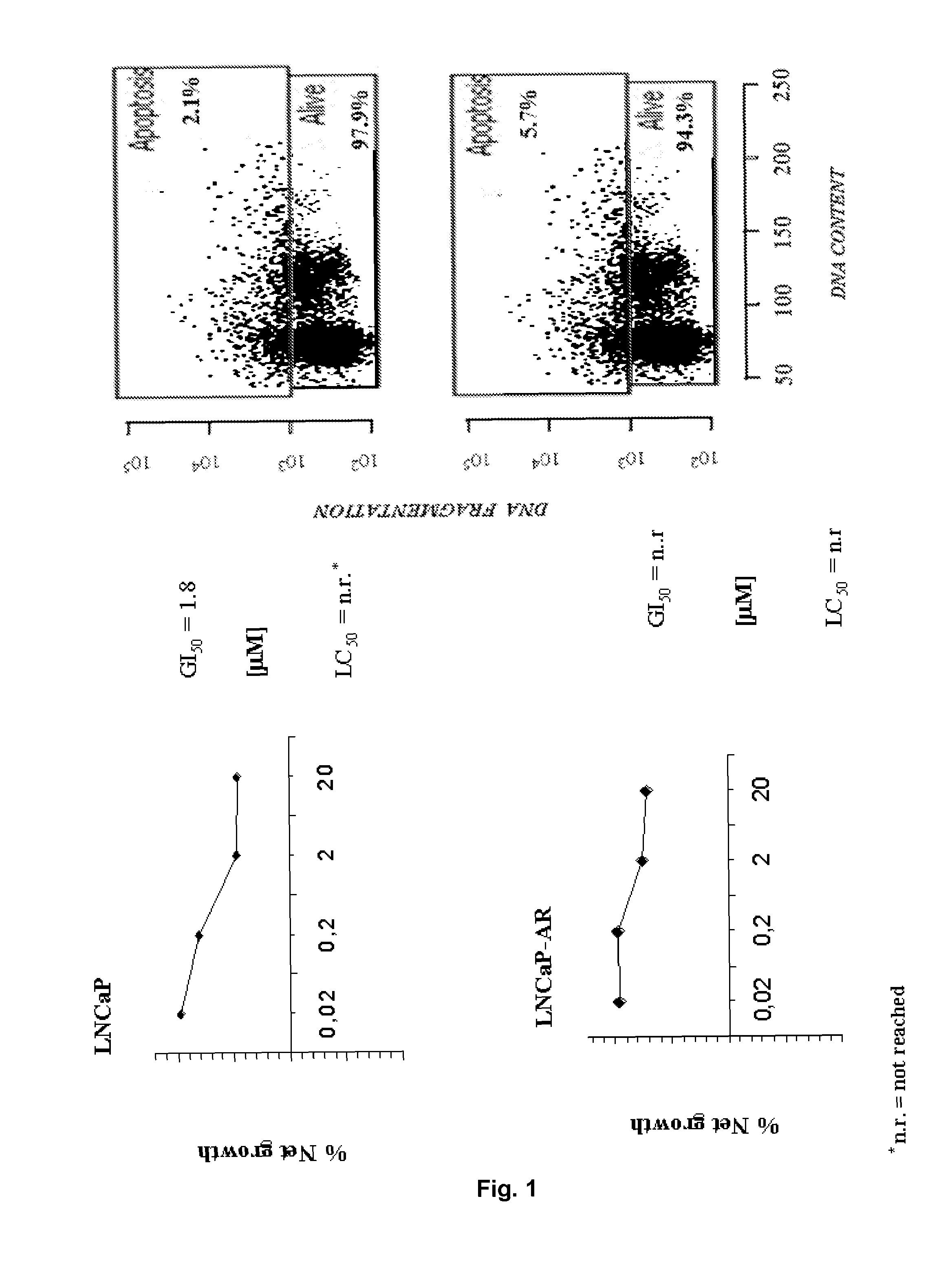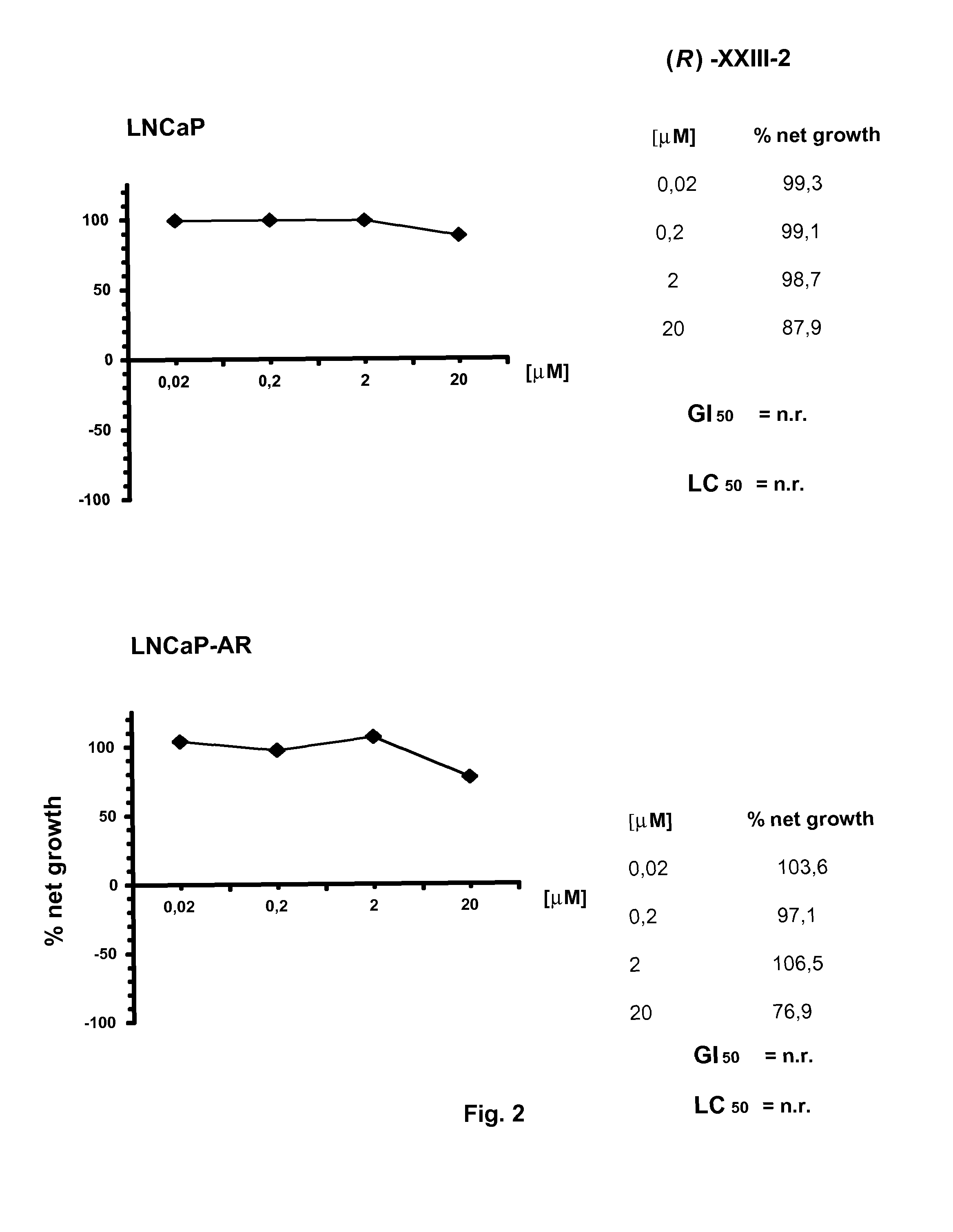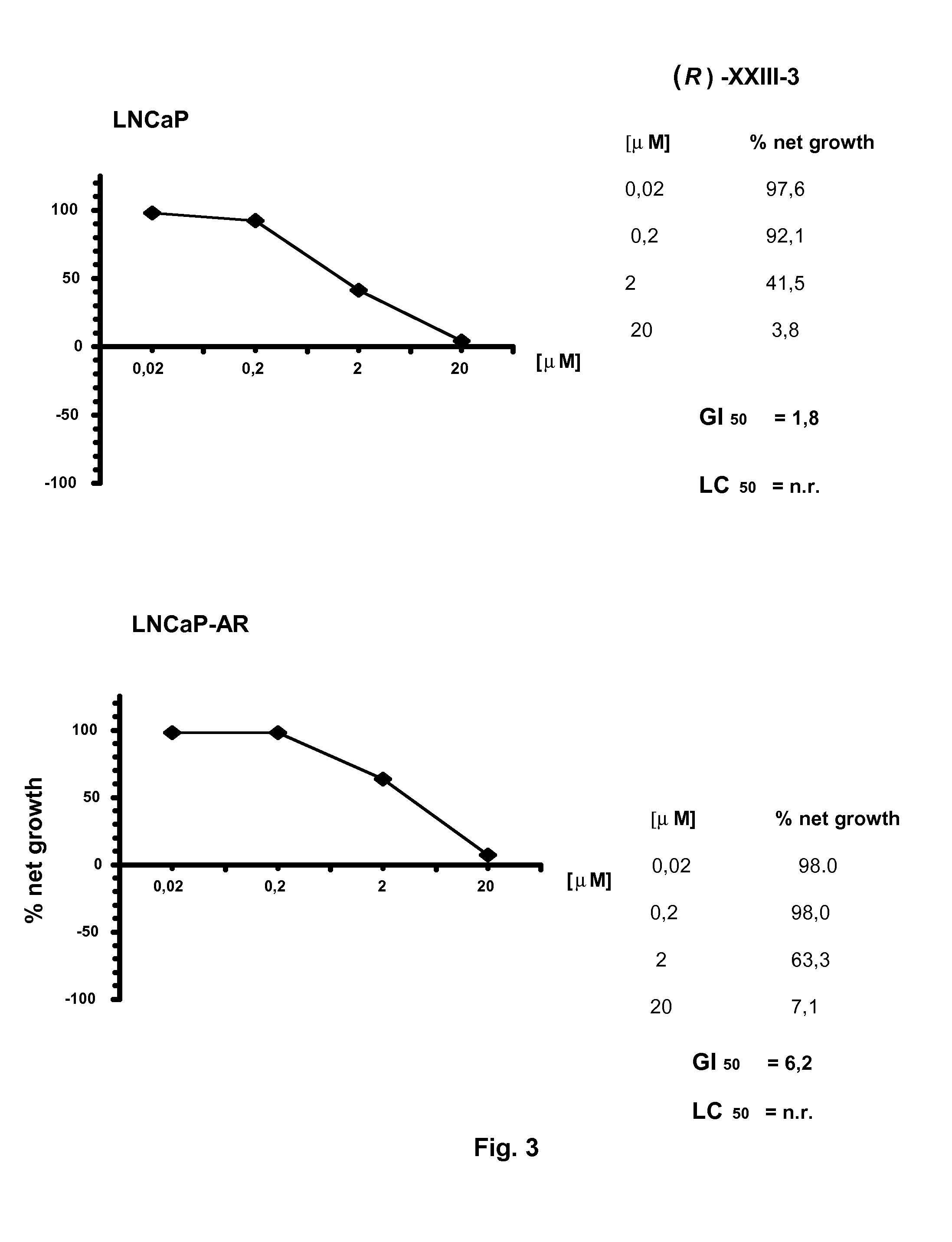Non-steroidal compounds for androgen receptor modulation
a technology of androgen receptor and non-steroidal compounds, which is applied in the direction of plant growth regulators, biocide, animal husbandry, etc., can solve the problems of limited use of cyproterone acetate (cpa), a synthetic derivative, and unstable receptor-antiandrogen complex, so as to reduce the severity, delay the onset, and reduce the incidence
- Summary
- Abstract
- Description
- Claims
- Application Information
AI Technical Summary
Benefits of technology
Problems solved by technology
Method used
Image
Examples
example 2
Synthesis of XXIII-1 and XXIII-2
[0255]
Synthesis of XIX (Representative Example)
[0256]Bromide (2S,5R)-VIII-1 was dissolved in a large excess of 6N HCl (6 eq.) and refluxed for 4 h. The reaction mixture was than cooled at room temperature, treated with brine and extracted (3 times) with ethyl acetate (EtOAc). The organic layer was than washed with a saturated solution of NaHCO3 and the aqueous solution was than acidified with HCl (pH=2) and extracted with EtOAc. The compound could be processed to the next step without any further purification.
[0257]The same procedure was exploited for the synthesis of (R)-XIX-2 and can, in principle be applied to all other derivatives.
[0258]
[0259](R)-XIX-1 for a complete characterization see: Tucker, H.; Chesterson, G. J. J. Med. Chem. 1988, 31, 885-887.
[0260]
[0261](R)-XIX-2 1H NMR (400 MHz, CDCl3): 10.9 (broad, 1H) 3.74 (d, J=10.4, 1H), 3.52 (d, J=10.4, 1H), 1.73-1.99 (m, 2H), 1.03 (t, 3H).
Synthesis of XX (Representative Example)
[0262]To a solution o...
example 3
Synthesis of XXIII-3 to XXIII-6
[0278]
Synthesis of XVI (Representative Example)
[0279]A solution of (R)-VIII-3 (1 eq.) in a 1 / 1 iPrOH / 1N NaOH mixed solvent was stirred at room temperature for 3 h, than 4-fluorobenzenethiol (1.6 eq) was added drop wise. The reaction mixture was additionally stirred a to room temperature for 16 h. The solution was than treated with 1 M HCl (till pH=8) and extracted twice with CH2Cl2. The pure compound was obtained by crystallization (CHCl3 / petrol ether).
[0280]
[0281](R)-XVI-1: 1H NMR (400 MHz, CDCl3): 7.44-7.41 (m, 2H, ArH), 7.27-7.20 (m, 5H, ArH), 6.97 (t, J=8.8 Hz, 2H, ArH), 3.43 (d, J=13.6 Hz, 1H, CH2), 3.26 (d, J=14.0 Hz, 1H, CH2), 3.12 (d, J=13.6 Hz, 1H, CH2), 3.01 (d, J=13.6 Hz, 1H, CH2). 13C NMR (100 MHz, CDCl3): 177.9, 134.7, (133.9, 133.8; d), 130.4, 128.6, 127.6, (116.4, 116.2; d), 78.6, 44.9, 44.8.
[0282]
[0283](R)-XVI-2: Yield: 98%; 1H NMR (400 MHz, CDCl3): 7.46-7.42 (m, 2H, ArH), 7.27-7.20 (m, 2H, ArH), 7.02-6.95 (m, 4H, ArH), 3.47 (d, J=18.0 ...
example 4
Synthesis of XXIII-7; XXIII-8 and XXIV-9
[0338]
Synthesis of XV-1 (Representative Example)
[0339]To a solution of 4-[(2S,4R)-4-(bromomethyl)-2-tert-butyl-5-oxo-1,3-dioxolan-4-yl-methyl]benzonitrile [(2S,4R)-VIII-7, 1 eq.] in dry dimethylformamide [6.5 ml×mmol di(2S,4R)-VIII-7], K2CO3 (2.2 eq.) and 4-fluorobenzenethiol (2 eq.) were added at room temperature. The reaction mixture was than stirred for 3-4 h [NB: when p-CN-phenol is used instead of 4-fluorobenzenethiol, the temperature is raised to 100° C. for 10 / 12 hrs]. The reaction mixture was than treated with distilled water, extracted with EtOAc and purified by silica gel column chromatography.
[0340]
[0341]Y=88%; (R)-XV-1: 1H NMR (400 MHz, CDCl3): 7.61 (d, J=8.0 Hz, 2H, ArH), 7.45-7.41 (m, 2H, ArH), 7.37 (d, J=8.0 Hz, 2H, ArH), 6.99 (t, J=8.4 Hz, 2H, ArH), 3.35 (d, J=13.6 Hz, 1H, CH2), 3.28 (d, J=14.0 Hz, 1H, CH2), 3.19 (d, J=14.0 Hz, 1H, CH2), 3.16 (d, J=14.0 Hz, 1H, CH2), 0.79 (s, 9H, tBu). 13C NMR (100 MHz, CDCl3): 173.2, 163.8, 16...
PUM
| Property | Measurement | Unit |
|---|---|---|
| temperature | aaaaa | aaaaa |
| temperature | aaaaa | aaaaa |
| temperature | aaaaa | aaaaa |
Abstract
Description
Claims
Application Information
 Login to View More
Login to View More - R&D
- Intellectual Property
- Life Sciences
- Materials
- Tech Scout
- Unparalleled Data Quality
- Higher Quality Content
- 60% Fewer Hallucinations
Browse by: Latest US Patents, China's latest patents, Technical Efficacy Thesaurus, Application Domain, Technology Topic, Popular Technical Reports.
© 2025 PatSnap. All rights reserved.Legal|Privacy policy|Modern Slavery Act Transparency Statement|Sitemap|About US| Contact US: help@patsnap.com



